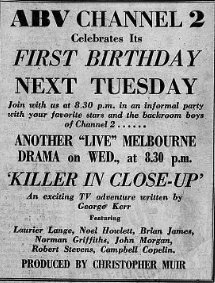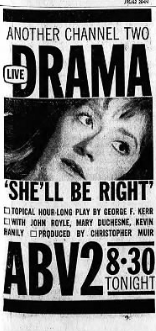
Stormy Petrel is an early Australian television drama. A period drama, the 12-episode serial told the story of William Bligh and aired in 1960 on ABC. It was the first live TV serial from the ABC.

The Patriots was an Australian television drama mini-series. A period-drama, it aired for 10 episodes on ABC in 1962.
Treason is a 1959 Australian television live drama, which aired on ABC about the 20 July plot during World War Two. Originally broadcast 16 December 1959 in Melbourne, a kinescope ("telerecording") was made of the program and shown in Sydney on 13 January 1960. It was an adaptation of a stage play by Welsh writer Saunders Lewis, which had previously been adapted as an episode of BBC Sunday-Night Theatre.
A Little South of Heaven is Australian live television play which aired in 1961 on ABC. It was based on a radio play by D'Arcy Niland and Ruth Park.

"No Picnic Tomorrow" is an Australian television drama one-off which aired in 1960 on ATN-7 in Sydney and GTV-9 in Melbourne. Part of the Shell Presents series of one-off television dramas and comedies, it was produced in Melbourne, but first shown in Sydney on 9 January 1960, and on 23 January 1960 Melbourne.

Ballad for One Gun is a 1963 Australian television film about Ned Kelly broadcast on ABC.

Killer in Close-Up was a blanket title covering four live television drama plays produced by the Australian Broadcasting Commission in 1957 and 1958. It could be seen as the first anthology series produced for Australian television.
"The Big Killing" is a 1965 Australian television film which aired on ABC. A murder drama aired in a 70-minute time-slot, it was produced in ABC's Sydney studios. Producer was James Upshaw, whose previous works had included variety series The Lorrae Desmond Show.
The Case of Private Hamp is a 1962 Australian television film which aired on the ABC. Despite the wiping of the era, a copy of the presentation exists as a kinescope recording.
Australian Playhouse was an Australian anthology TV series featuring the work of Australian writers.

The Sergeant from Burralee is an Australian television play written by Phillip Grenville Mann. The play was also broadcast by the BBC and screened for West German television.
Jenny is a 1962 Australian TV drama.

Corinth House is a 1961 Australian TV movie based on the play by Pamela Hansford Johnson and directed by Bill Bain. It was sold overseas.
Outpost is a 1959 Australian television play about Australian soldiers in New Guinea during World War Two. It was written for television by John Cameron.
George F. Kerr was an English writer best known for his work in TV. He worked for eight years in British TV as a writer and script editor.

A Night Out is a 1961 Australian television play. It was based on A Night Out by Harold Pinter. It starred John Ewart and Richard Meikle.
Christopher Muir was an Australian director and producer, notable for his work in TV in the 1950s and 1960s. In the 1980s he was head of ABC Television drama.
Eye of the Night is a 1960 Australian television play. It was written by Kay Keavney and directed by Christopher Muir.
Marriage Lines is a 1962 Australian television play directed by Christopher Muir.
Luther is a 1964 TV play broadcast by the Australian Broadcasting Corporation. It was adapted by Phillip Grenville Mann from the 1961 play by John Osborne. It was directed in Melbourne by Christopher Muir and starred Terry Norris in the title role.








